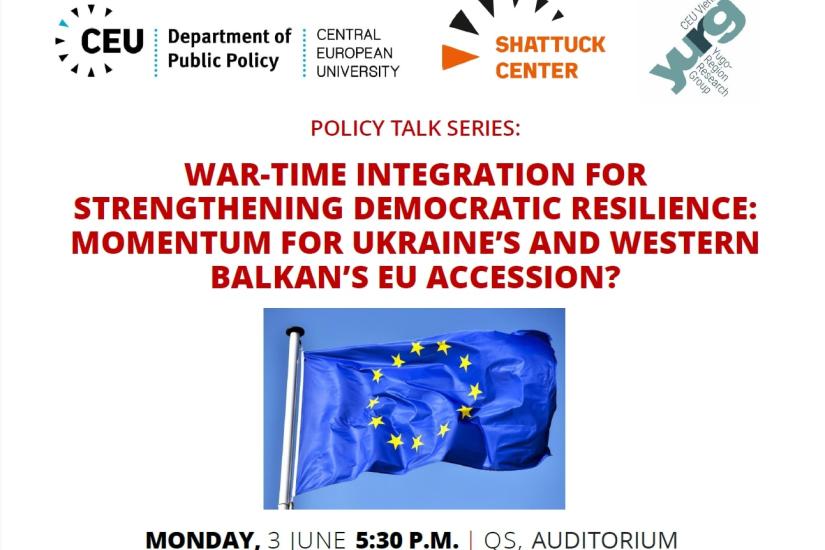
The Shattuck Center for Human Rights in the framework of its 2024 Lemkin Reunion “Healing Ukraine: Post-conflict Management and Human Rights"
&
The CEU Department of Public Policy in framework of its Policy Talks Series as a way to engage critically with today's global and local issues
in partnership with CEU Ukrainians Association and Yugo-Region Research Group
invite You to the separate roundtable policy discussion “War-time integration for strengthening democratic resilience: momentum for Ukraine’s and Western Balkan’s EU accession?”
Description:
The full-fledged Russian invasion of Ukraine became the latest from the long chain of multiple crises that hit the EU during the last decade. Despite increased security threats for the whole region and hurdles with increased migration from both Ukraine and Russia, this conflict could have a transformative impact on the EU.
The war not only opened the door for potential Ukraine’s EU membership but also could have implications for speeding up the integration process of Western Balkan countries, such as Bosnia and Herzegovina, Montenegro, Northern Macedonia and Serbia. On the other hand, the EU’s potential enlargement to the club of 30+ member states makes the reform of its internal governance procedures almost inevitable, spurring active debates about the content and scope of possible changes.
For decades, EU has promoted itself as "a normative power Europe" (Manners 2002) aiming at ensuring security, human rights protection, and democratic stability all over the world with a special focus on the EU's closest neighborhood. The steady evolution of the EU as a political entity was a story of peaceful economic integration mitigating long-lasting conflicts between neighboring countries and unifying the continent not only on the joint strive for economic prosperity, but also on the integrative symbolic power of democratic values as an inherent part of the all-European culture.
Nevertheless, “rhetorical entrapment” (Schimmelfennig 2001) of Europeans is not always definitive for the policy outcomes of enlargement talks and the speed of the whole integration procedure. The final result is often defined by other factors, such as considerations of enlargement’s economic feasibility for internal EU economic interests and effective diplomatic effort of accession candidates in both their communication with EU institutions and preparedness for committing real changes at home. Diverging cases of rapid Central European EU accession after the collapse of communist regimes in the region and protracted western Balkan integration in the aftermath of dramatic and tragic events of ethnic violence during the time of disintegration of former Yugoslavia are the prime illustration for that fact, that the political process of European integration is much complex, nuanced and multi-linear than political rhetoric surrounding its inflow.
Currently discussed "war-time enlargement" raises a lot of important questions about trajectories of internal EU institutional change and recent dynamic of EU relations with its closest neighbors.
- What are the main institutional changes and opportunities for Brussels to accommodate the new enlargement?
- Could the experience of protracted integration of Western Balkans serve as an argument against an over-optimistic view on the timing of the next possible EU enlargement? And how Russo-Ukrainian war is viewed in the region in the light of its EU accession strategy?
- Is the case of Ukraine’s bid for EU membership unique due to its extraordinary circumstances or could we trace some parallels with earlier EU enlargements? And what impact will have the understanding of that uniqueness by Brussels decision-making on defining the procedure of country’s accession?
- Taking into account the hard social consequences of military conflict and centralization of political power in Ukraine under the conditions of martial law, could that somehow backfire on the quality of democratic governance and ensuring human rights, harming the country’s opportunities for EU integration?
- Which role will play the need for multi-dimensional improvement of human rights conditions in the accession conditionality of potential new EU members?
Discussion participants:
Michael Emerson, Associate Senior Research Fellow at Center of European Policy Studies (CEPS), Brussels, Belgium.
Jelena Dzankic, Part-Time Professor in the Global Governance Programme at the Robert Schuman Centre of the European University Institute in Florence, Italy.
Maryna Rabinovych, Associate Professor at the Kyiv School of Economy, Kyiv, Ukraine & Postdoctoral Research Fellow, University of Agder, Norway.
Moderator:
Ihor Moshenets, PhD Candidate, Doctoral School of Political Science, Central European University.